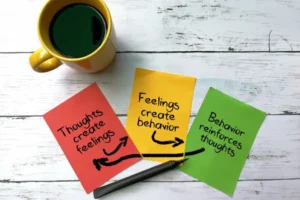In an era where digital solutions are reshaping every aspect of our lives, mental health support has also transitioned into the virtual space, offering new avenues for therapy and self-improvement. Cognitive Behavioral Therapy (CBT), a well-established psychological treatment, is now increasingly accessible online, providing effective tools for managing anxiety, depression, and other mental health challenges. This blog explores how online CBT is revolutionizing therapy, making mental health care more accessible, flexible, and tailored to individual needs.
Contents
Can CBT be Done Online?
 Yes, Cognitive Behavioral Therapy (CBT) can be conducted online. And it has become increasingly popular this way. Online CBT allows you to interact with a therapist through video calls, messaging, or digital platforms that are designed specifically for therapy. This method provides the same principles and techniques as traditional face-to-face therapy. And may include exercises and regular feedback from a licensed therapist.
Yes, Cognitive Behavioral Therapy (CBT) can be conducted online. And it has become increasingly popular this way. Online CBT allows you to interact with a therapist through video calls, messaging, or digital platforms that are designed specifically for therapy. This method provides the same principles and techniques as traditional face-to-face therapy. And may include exercises and regular feedback from a licensed therapist.
The effectiveness of online CBT has been supported by numerous studies showing that it can be just as effective as in-person sessions for a variety of mental health issues. Online platforms often offer additional resources like interactive modules, daily activity trackers, and supportive content. That will further enhance the therapy experience.
When Should I Consider CBT Online?
You might consider online Cognitive Behavioral Therapy (CBT) if you find yourself facing certain situations or conditions where accessing traditional therapy is challenging or less convenient. Here are some scenarios where online CBT could be particularly beneficial:
- Busy Schedule: If your daily routine makes it hard to commit to in-person sessions due to time constraints or unpredictable work hours. Then, online CBT offers the flexibility to attend sessions from anywhere, fitting therapy into your lifestyle.
- Limited Local Resources: If you live in an area with few mental health professionals or if specialized CBT therapists are not available nearby. Then, online therapy can provide access to qualified therapists regardless of geographical boundaries.
- Physical Limitations: For those with physical disabilities or illnesses that make traveling difficult, online sessions ensure that you can receive consistent therapy without the physical strain of commuting.
- Preference for Privacy: If you prefer more privacy and anonymity than might be possible with in-person visits, online CBT allows you to receive help without having to visit a therapist’s office. This some find less stigmatizing.
- Ongoing Support Needs: Online CBT can be an excellent tool for continued support. Especially if you’ve completed an initial course of therapy traditionally and are looking for a convenient way to maintain the gains you’ve achieved.
- Pandemic Restrictions: In times of public health concerns, like during the COVID-19 pandemic, online therapy ensures continuous access to mental health support.
Thus, if you’re experiencing symptoms of anxiety, depression, stress, or other mental health issues that are impacting your daily life. Then, CBT online might be a suitable and effective option for you.
What Are The Common Approaches Used?
 Cognitive Behavioral Therapy (CBT) utilizes a variety of techniques and approaches to help individuals understand and change patterns of thinking and behavior. Here are some of the core approaches used in both traditional and online CBT:
Cognitive Behavioral Therapy (CBT) utilizes a variety of techniques and approaches to help individuals understand and change patterns of thinking and behavior. Here are some of the core approaches used in both traditional and online CBT:
Cognitive Restructuring
This core component of CBT involves working with a therapist to identify negative and often irrational thoughts that contribute to emotional distress. For example, someone who believes they “always fail” might examine specific past experiences to identify evidence that contradicts this belief. The therapist guides the client to reshape these thoughts into more accurate and less harmful interpretations.
Behavioral Activation
Particularly effective for combating depression, behavioral activation helps clients engage more fully with their lives. The therapist encourages the client to schedule positive, rewarding activities, even when they don’t feel motivated. The goal is to disrupt the cycle of depression where low mood leads to inactivity. This, in turn, leads to increased depression. Over time, increased engagement in meaningful activities can lead to improved mood and energy levels.
Exposure Therapy
The exposure is done in a controlled and safe setting, where the client can face their fears without any real-world risks. This method helps reduce the fear response over time. For instance, someone with a fear of flying might start by watching videos of planes, then visit an airport, and eventually take short flights, all under the guidance of a therapist.
Skill Training
Stress management techniques might include learning how to recognize signs of stress and applying relaxation techniques like deep breathing or progressive muscle relaxation. Assertiveness training can help clients express their needs and boundaries more clearly and effectively, while problem-solving skills can empower them to navigate difficult situations more confidently.
Mindfulness and Relaxation Techniques
Mindfulness involves being present in the moment without judgment. This can reduce the impact of distressing thoughts and feelings. Relaxation techniques like guided imagery or meditation can help calm the mind and body, making it easier to manage stress and anxiety. Regular practice of these techniques can significantly enhance emotional regulation and overall mental health.
Homework Assignments
To reinforce the skills learned in therapy sessions, CBT therapists often assign homework. These tasks are designed to encourage clients to apply what they’ve learned in real-world situations. Thus, it can accelerate progress. Homework might include journaling about daily thoughts and feelings, practicing relaxation exercises, or completing specific assignments that challenge old behaviors and encourage new ones.
Thus, these approaches collectively make CBT a highly effective and versatile form of therapy, applicable to a wide range of psychological issues. Whether conducted in-person or online, these techniques can be adapted to meet the unique needs of each client.
What Are The Pros And Cons Of CBT Online?
 Online Cognitive Behavioral Therapy (CBT) offers a unique set of advantages and some potential drawbacks compared to traditional in-person therapy. Here’s a detailed look at the pros and cons:
Online Cognitive Behavioral Therapy (CBT) offers a unique set of advantages and some potential drawbacks compared to traditional in-person therapy. Here’s a detailed look at the pros and cons:
Pros
- Accessibility: One of the biggest advantages of online CBT is its accessibility. It can be a valuable resource for people in remote areas or those with mobility issues who might not otherwise have access to mental health services.
- Convenience: Online therapy sessions can be scheduled more flexibly, fitting into busy lifestyles more easily than traditional therapy. This convenience also includes eliminating commute times and the ability to attend sessions from the comfort of one’s own home.
- Anonymity and Privacy: Some individuals may feel more comfortable addressing sensitive issues from the privacy of their home. This can reduce the stigma or embarrassment they might feel in going to a therapist’s office.
- Consistency: Online CBT allows clients to maintain regular sessions even during travel or relocation, ensuring continuity of care that can be critical for effective therapy.
- Innovative Tools: Many online platforms incorporate additional tools such as mood trackers, journaling, and interactive homework modules. This will enhance the therapeutic process and allow for real-time monitoring and feedback.
Cons
- Technology Issues: Dependence on technology means that poor internet connectivity or hardware issues can disrupt sessions and impact the overall therapy experience.
- Limited Therapeutic Alliance: Some argue that the physical presence in traditional therapy helps build a stronger therapeutic alliance. The screen barrier might inhibit some of the nuanced communication, such as body language cues. This can be pivotal in therapy.
- Privacy and Security Concerns: Transmitting sensitive information online always carries a risk. Despite encryption and other security measures, there are potential vulnerabilities that could compromise client confidentiality.
- Not Suitable for Everyone: Online CBT might not be effective for individuals with more severe mental health issues who require more intensive supervision or support. It’s also less suitable for those who are not comfortable using digital communication tools.
- Regulatory and Licensing Issues: There can be complications related to the licensing of therapists across different states or countries. And, potentially limiting the availability of qualified professionals in certain regions.
Overall, online CBT offers a viable alternative to traditional therapy. Hence, making mental health care more accessible and adaptable to modern lifestyles. However, it’s important to weigh these factors and consider personal preferences and specific needs when deciding if online CBT is the right choice.
Conclusion
Online Cognitive Behavioral Therapy (CBT) presents a modern solution to accessing mental health care, breaking down barriers related to distance, time, and stigma. With the advantages of convenience, privacy, and innovative digital tools, online CBT makes therapy accessible to more people, fitting seamlessly into daily life. However, it’s important to consider the potential challenges. Ultimately, whether online CBT is the right choice depends on individual needs, circumstances, and preferences.
For more information, please contact MantraCare. Online therapy types include videoconferencing, phone sessions, messaging-based therapy, chat-based therapy, and therapy based on different problems. If you have any queries regarding Online Counseling experienced therapists at MantraCare can help: Book a trial therapy session


